What Is the Meaning of Exodus in the Bible? Freedom Journey
The Book of Exodus in the Bible narrates the Israelites’ emancipation from Egyptian slavery, highlighting critical themes of divine intervention, liberation, and covenant. This narrative is set against the socio-political backdrop of ancient Near Eastern traditions.
Key events include Moses’ leadership, the ten plagues, the miraculous crossing of the Red Sea, and the establishment of the covenant at Mount Sinai, where the Ten Commandments were given. These elements collectively underscore a shift from bondage to nationhood under divine law, forming a cornerstone of Jewish and Christian theological and cultural identity.
To explore these profound themes more deeply, further examination of the text is essential.
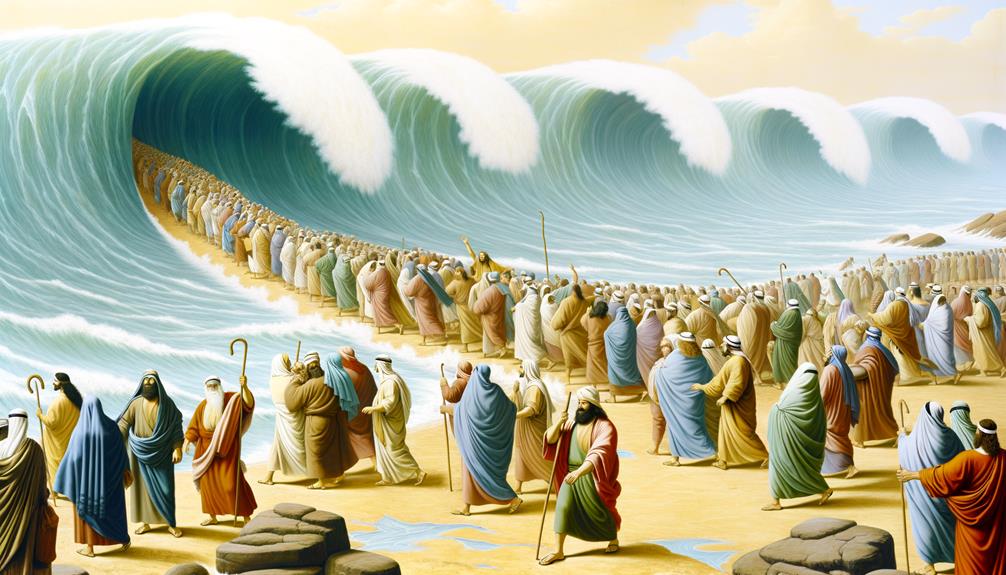
Meaning of Exodus in the Bible: Deliverance, Covenant, and Redemption
| Aspect | Description |
|---|---|
| Definition | “Exodus” means “a going out” or “departure” |
| Biblical Book | Second book of the Bible |
| Key Event | Israelites’ liberation from Egyptian slavery |
| Spiritual Significance | Symbolizes redemption, God’s faithfulness, and covenant relationship |
| Major Themes | Freedom, obedience, divine law, and God’s guiding presence |
Historical Context

The historical context of the Exodus narrative is deeply rooted in the socio-political and religious landscape of ancient Egypt and the broader Near Eastern region during the second millennium BCE.
This era, marked by the dominance of powerful empires such as Egypt, was characterized by complex interactions, trade, and conflicts among various peoples.
The Hebrews, under Egyptian bondage, experienced significant socio-economic pressures and religious constraints.
Egyptian records and archaeological findings provide a backdrop to the biblical account, suggesting a period of hardship and forced labor for Semitic populations.
Additionally, the narrative reflects broader themes of liberation and covenant, resonating with contemporaneous Near Eastern traditions of divine deliverance and societal transformation.
Such historical insights illuminate the Exodus as both a cultural memory and a theological construct.
Key Themes
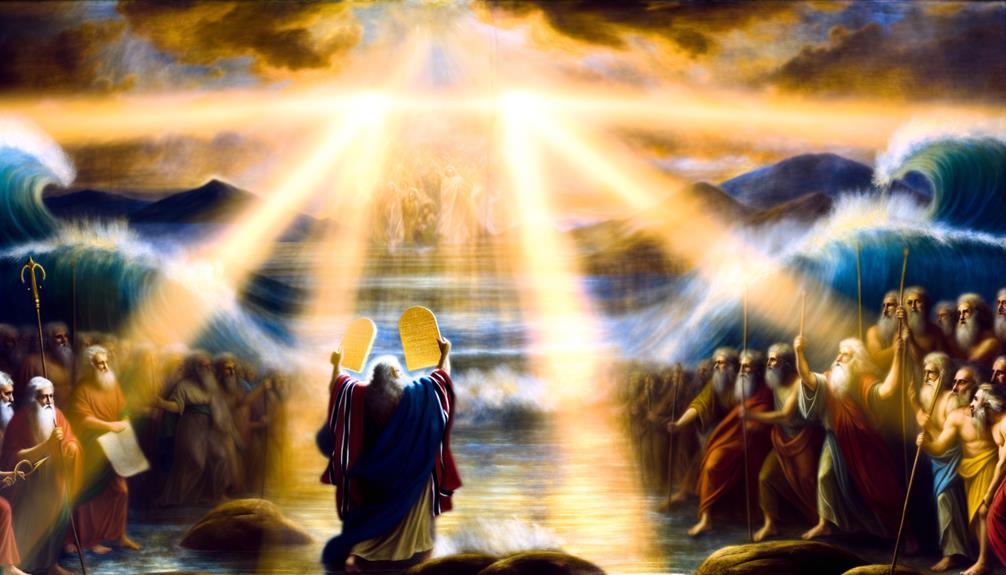
Central to the Exodus narrative are themes of liberation, covenant, and divine intervention, each contributing to the story’s enduring theological and cultural significance.
Liberation is vividly depicted in the Israelites’ escape from Egyptian bondage, symbolizing freedom from oppression.
The covenant theme underscores the establishment of a unique relationship between God and the Israelites, articulated through the giving of the Law at Sinai.
Divine intervention is evident in the numerous miracles, such as the parting of the Red Sea and the provision of manna, which underscore God’s active involvement.
- Liberation: Escape from Egyptian slavery, representing freedom.
- Covenant: Establishment of a unique relationship with God.
These themes collectively shape the Exodus as foundational to Jewish and Christian theology.
Moses’ Role

Moses’ role in the Exodus narrative is pivotal, encompassing his divine calling, his leadership amidst numerous challenges, and his facilitation of the Israelites’ deliverance and the establishment of the covenant at Sinai.
His divine encounter at the burning bush marks the inception of his mission, which is characterized by both miraculous interventions and profound struggles.
Through Moses, the themes of liberation and covenant are interwoven, highlighting his central function in the theological and historical dimensions of the Exodus story.
Moses’ Divine Calling
How did Moses’ divine calling shape his pivotal role in the Exodus narrative?
Moses’ encounter with God at the burning bush (Exodus 3:1-4:17) was a transformative event that defined his mission to lead the Israelites out of Egyptian bondage. This divine calling established Moses as a prophet, mediator, and leader, granting him both authority and responsibility.
- Prophet: Moses was chosen as the mouthpiece of God, tasked with conveying divine commands to the Israelites and Pharaoh.
- Mediator: He served as an intermediary between God and the people, negotiating their release and receiving the Law on Mount Sinai.
Moses’ divine calling was consequently foundational to his instrumental role in the Exodus.
Leadership and Challenges
In traversing the arduous journey from Egypt to the Promised Land, Moses’ leadership was continually tested by both external threats and internal dissent among the Israelites. His role was not merely administrative but profoundly spiritual, as he mediated between God and the people.
Moses faced challenges such as Pharaoh’s obstinance, the logistical difficulties of sustaining a large population in the desert, and the Israelites’ recurring lapses into doubt and rebellion. Each crisis, from the lack of water and food to the worship of the Golden Calf, required Moses to demonstrate resilience and faith.
His ability to navigate these multifaceted challenges underscores his significance as a leader who balanced divine guidance with pragmatic decision-making.
Deliverance and Covenant
Central to the narrative of Exodus is the theme of deliverance, embodied through the covenant established between God and the Israelites, which was mediated by Moses. This significant event underscores Moses’ critical role as a leader and prophet, representing divine authority and guiding Israel out of Egyptian bondage.
Moses receives the Ten Commandments, symbolizing the formal establishment of Israel’s unique relationship with God.
Moses leads the Israelites through the Red Sea, marking their emancipation from slavery. The covenant at Mount Sinai serves as the foundation for Israelite law and identity.
Through these actions, Moses not only delivers the Israelites but also solidifies their covenantal bond with God.
The Plagues

The ten plagues described in the Book of Exodus serve as pivotal events that demonstrate the power of Yahweh over the gods of Egypt and catalyze the liberation of the Israelites from bondage.
Each plague systematically dismantles the Egyptian pantheon, challenging deities associated with the Nile, fertility, and health. The plagues escalate in severity, starting with the transformation of water into blood and culminating in the death of the firstborn. This progression not only emphasizes divine authority but also reveals the futility of Pharaoh’s resistance.
The plagues are not random acts of destruction; they are deliberate, theological statements aimed at dismantling the Egyptian religious system and affirming Yahweh’s supremacy, ultimately leading to the Israelites’ emancipation and the fulfillment of divine promises.
The Passover
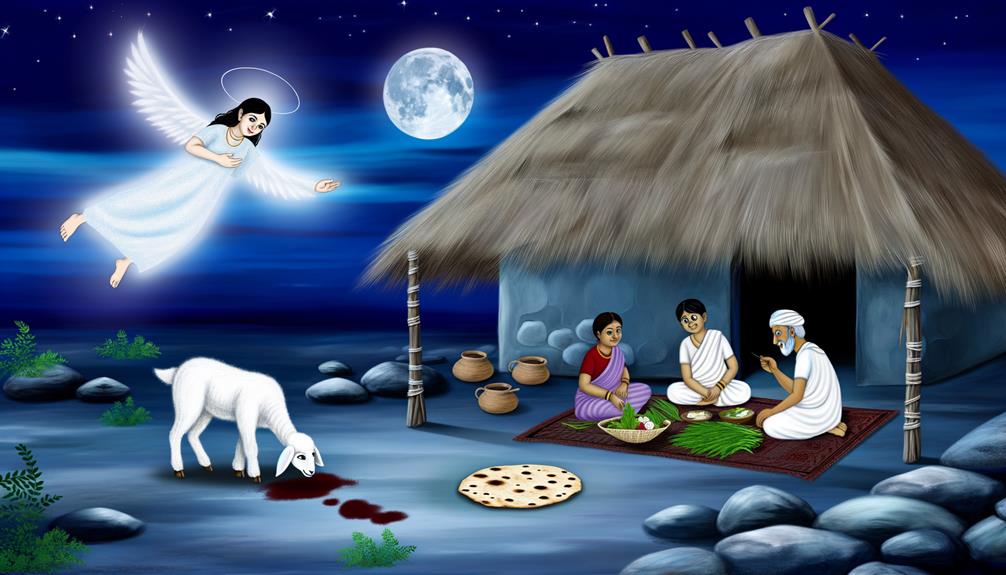
Marking a significant ritual in Jewish tradition, Passover commemorates the Israelites’ deliverance from Egyptian captivity, symbolized through the sacrificial lamb and the protection it afforded against the final plague.
This observance is intricately linked to the narrative of the tenth plague, where the firstborn of Egypt were struck down, sparing the Israelites who marked their doorposts with lamb’s blood.
Key elements of Passover include:
- The Seder Meal: A ritual feast that retells the Exodus story, featuring symbolic foods.
- Unleavened Bread (Matzah): Consumed to recall the haste of the Israelites’ departure, leaving no time for their bread to rise.
These practices encapsulate themes of liberation, faith, and divine intervention.
Crossing the Red Sea
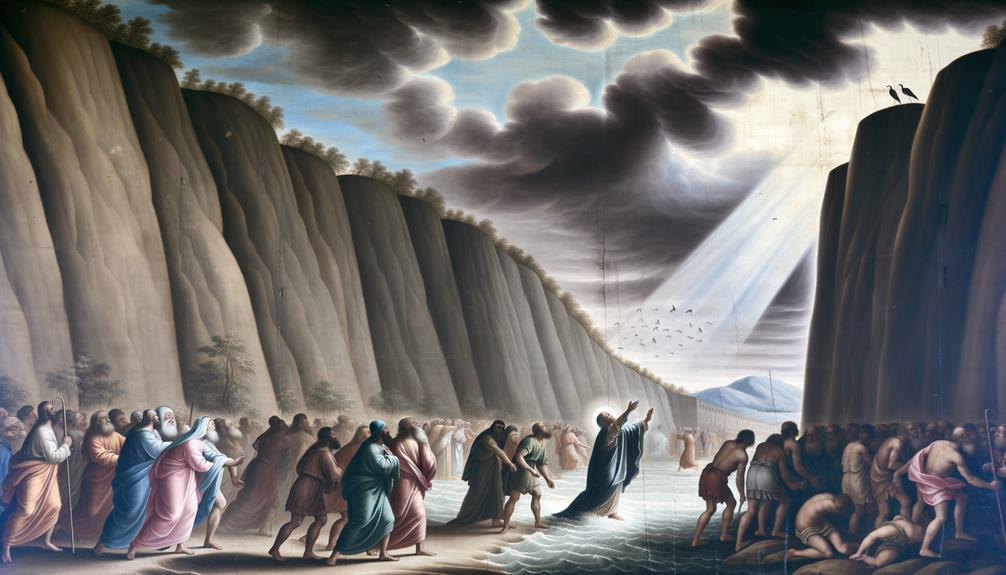
The Crossing of the Red Sea represents a pivotal moment in the Exodus narrative, underscoring the miraculous intervention of divine power.
As the Israelites faced relentless pursuit by the Egyptians, the parting of the sea provided not only an escape route but also symbolized a transformative path to freedom.
This event encapsulates the shift from slavery to liberation, serving as a foundational element in the collective memory and identity of the Israelite people.
Miracle at the Sea
Dramatically illustrating divine intervention, the crossing of the Red Sea stands as a pivotal moment in the biblical narrative of Exodus, symbolizing liberation and the triumph of faith over adversity. This event is not merely a historical account but a theological statement emphasizing God’s power and protection over the Israelites.
- Symbol of Deliverance: The parting of the sea represents God’s deliverance from bondage.
- Test of Faith: It underscores the faith required to follow divine guidance in dire circumstances.
- Manifestation of Divine Power: The miraculous nature of the event attests to God’s omnipotence.
In scholarly discourse, the crossing of the Red Sea is viewed as a foundational element that shapes the Israelites’ identity, reinforcing their covenant relationship with God and their collective memory of emancipation.
Pursuit by Egyptians
Amid the Israelites’ flight from Egypt, the relentless pursuit by Pharaoh’s army underscores the high stakes of their escape and the imminent danger they faced. This dramatic episode highlights the existential threat to the nascent nation, juxtaposing divine liberation against human oppression.
The narrative conveys the urgency and fear experienced by the Israelites, trapped between the formidable Egyptian forces and the impassable Red Sea. This context enriches the theological interpretation of the Exodus, portraying God as a deliverer who decisively intervenes in history.
The pursuit by the Egyptians not only emphasizes the peril but also sets the stage for the subsequent miraculous deliverance, reinforcing themes of faith, divine power, and the ultimate triumph of freedom over subjugation.
Path to Freedom
Crossing the Red Sea stands as a pivotal moment in the Exodus narrative, symbolizing the shift from bondage to liberation and showcasing the profound intervention of divine power in the Israelites’ journey to freedom. This event, detailed in Exodus 14, serves not merely as a historical account but as a theological cornerstone, illustrating several key themes:
- Divine Intervention: The parting of the Red Sea underscores God’s active role in delivering His people.
- Faith and Obedience: The Israelites’ passage through the sea required trust in Moses’ leadership and God’s promises.
- Judgment and Salvation: The subsequent drowning of Pharaoh’s army contrasts divine judgment against oppressors with the salvation of the oppressed.
Together, these elements highlight the multifaceted dimensions of liberation in the biblical text.
Covenant at Sinai
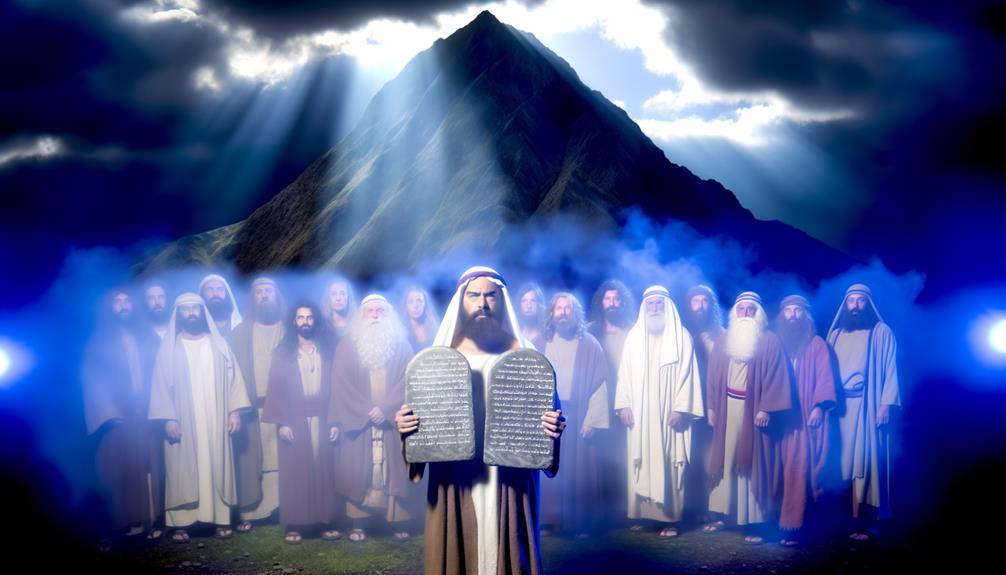
The Covenant at Sinai represents a pivotal moment in the biblical narrative, wherein God establishes a formal agreement with the Israelites, delineating their obligations and solidifying their identity as His chosen people.
This covenant, articulated through the giving of the Ten Commandments and other laws, forms the bedrock of Israelite religious and social life. It underscores a reciprocal relationship: God promises to be their protector and guide, while the Israelites commit to adhering to His laws.
The Sinai covenant also marks a shift from a loosely connected group of tribes to a nation bound by a common legal and ethical framework.
This moment is foundational, deeply influencing subsequent theological developments and communal structures within the biblical tradition.
Modern Relevance
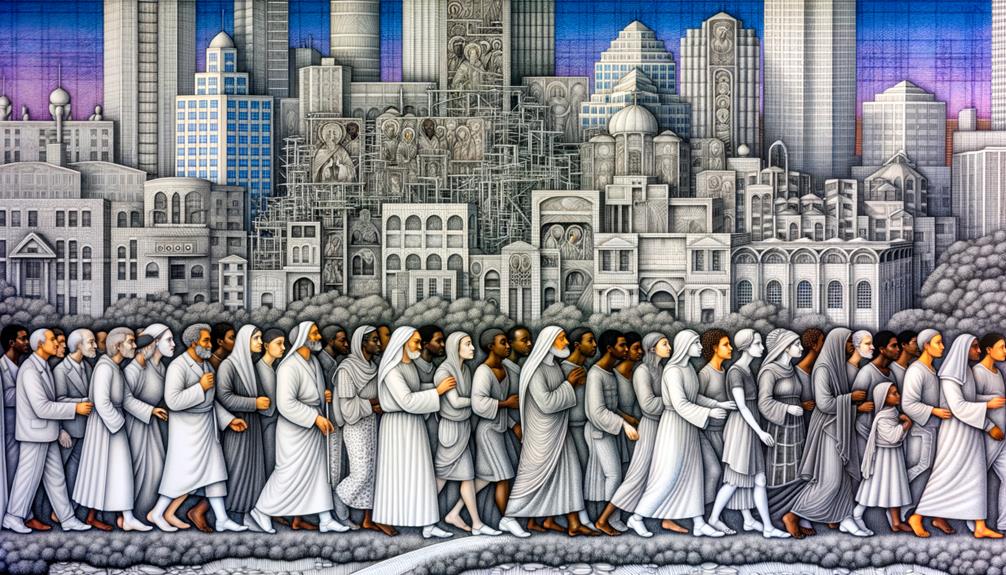
Understanding the Covenant at Sinai’s historical and theological significance prompts reflection on its enduring impact and relevance in contemporary society. The Exodus narrative’s themes continue to resonate, offering profound insights into human experience and moral frameworks. Its modern relevance manifests in several ways:
- Liberation Theology: The story of Exodus inspires movements advocating for social justice and liberation from oppression.
- Law and Morality: The Ten Commandments remain foundational to ethical and legal systems globally.
- Identity and Community: The Exodus underscores themes of identity formation and communal solidarity, pertinent in multicultural and diverse societies.
Exploring these aspects reveals the timeless applicability of the Exodus narrative, highlighting its role in shaping contemporary thought and values.
Conclusion
The term ‘exodus‘ in the Bible signifies a pivotal moment in Jewish history, with profound theological and cultural implications.
An interesting statistic is that the account of the Exodus is referenced over 120 times in subsequent biblical texts, underscoring its enduring significance.
This narrative not only details the Israelites’ liberation from Egyptian bondage but also establishes foundational themes such as divine intervention, covenantal relationships, and communal identity, which continue to resonate in contemporary religious and cultural discourse.






